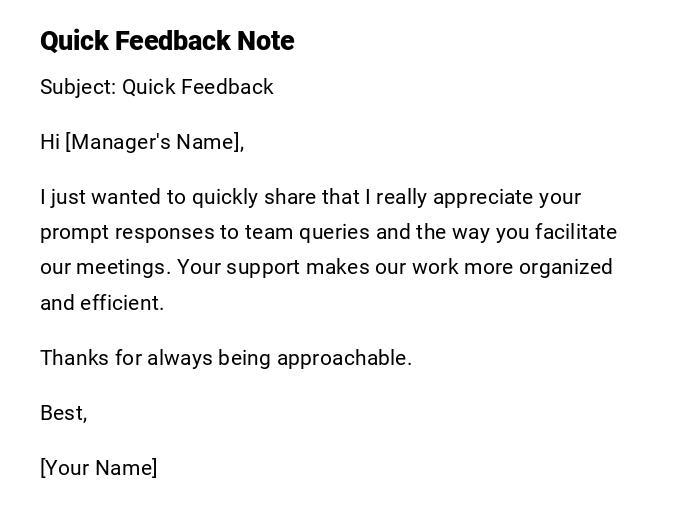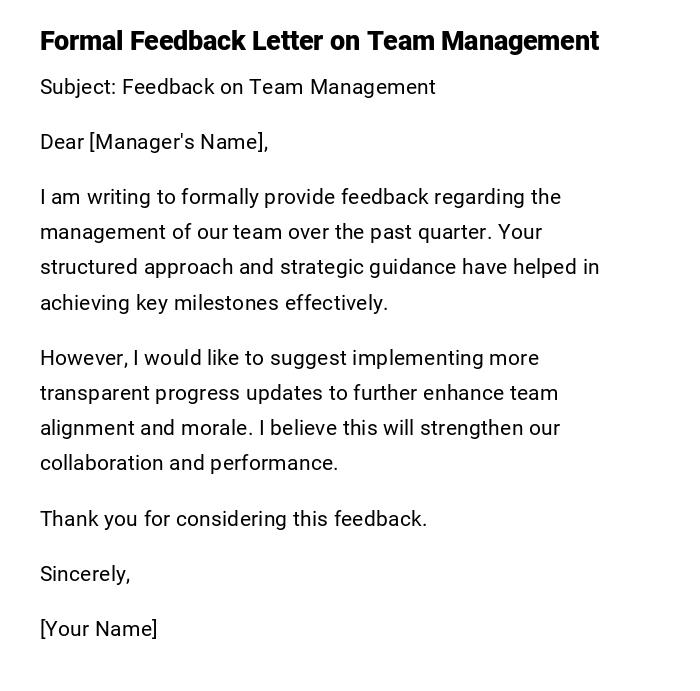Feedback Letter To Manager
Dear [Manager's Name],
I hope this letter finds you well. I am writing to provide some feedback and express my thoughts regarding my experience working at [Company Name]. I appreciate the opportunity to share my perspective and contribute to the ongoing improvement of our work environment.
Firstly, I would like to express my gratitude for the support and guidance you have provided during my time at the company. Your leadership and management style have been instrumental in shaping my professional growth, and I am grateful for the trust and confidence you have placed in me.
I would like to highlight a few aspects of my experience that I believe have contributed positively to my work and the overall team dynamics. The open and transparent communication within our team has fostered a collaborative atmosphere, allowing for effective problem-solving and knowledge sharing. The regular team meetings and individual check-ins have been instrumental in keeping everyone aligned and informed about ongoing projects.
Additionally, I appreciate the opportunities provided for professional development. The training sessions and workshops organized by the company have allowed me to enhance my skills and stay updated with industry trends. This investment in the growth of the employees not only benefits individuals but also strengthens the team's collective capabilities.
Furthermore, I have noticed the positive work culture that prevails within our department. The emphasis on work-life balance and recognition of employees' achievements creates a supportive and motivating environment. The appreciation expressed for a job well done boosts morale and encourages continued dedication and commitment.
While I am generally satisfied with my experience at [Company Name], I would like to offer a few suggestions for consideration that could potentially enhance our work environment. Firstly, it would be beneficial to explore opportunities for cross-department collaboration. Encouraging interdepartmental projects or knowledge sharing sessions can foster a greater understanding of each other's roles and contribute to a more cohesive organization as a whole.
Additionally, implementing a flexible work policy, such as remote work or flexible hours, could potentially improve employee satisfaction and productivity. This flexibility would provide individuals with the autonomy to manage their work in a manner that suits their personal needs and preferences, ultimately leading to a healthier work-life balance.
Lastly, I believe it would be beneficial to conduct regular employee surveys or feedback sessions to gauge the overall employee satisfaction and identify areas for improvement. This would provide a platform for employees to express their opinions and concerns openly, contributing to a culture of continuous improvement.
Once again, I would like to express my gratitude for your leadership and support. I am committed to my role and the success of our team and am confident that by working together, we can create an even better work environment that aligns with the company's goals.
Thank you for your time and consideration. I look forward to your feedback and discussing these suggestions further.
Sincerely,
[Your Name]
Positive Feedback Letter to Manager
Subject: Appreciation for Your Leadership
Dear [Manager's Name],
I would like to take a moment to express my appreciation for your outstanding leadership and guidance. Your support has been instrumental in helping our team achieve our goals and maintain a positive work environment.
Your clarity in communication, approachability, and commitment to professional growth have not gone unnoticed. I feel motivated to contribute more and am grateful for your consistent encouragement.
Thank you for leading by example and fostering a collaborative atmosphere.
Sincerely,
[Your Name]
Constructive Feedback Email to Manager
Subject: Feedback on Project Workflow
Dear [Manager's Name],
I hope this email finds you well. I would like to provide some constructive feedback regarding our recent project workflow.
While the team has shown great commitment, I believe certain processes could be improved to enhance efficiency. For instance, clearer task assignments and more frequent check-ins may reduce misunderstandings.
I share this feedback with the intention of improving our overall productivity and ensuring smoother project execution.
Thank you for considering my suggestions.
Best regards,
[Your Name]
Quick Feedback Note for Manager
Subject: Quick Feedback
Hi [Manager's Name],
I just wanted to quickly share that I really appreciate your prompt responses to team queries and the way you facilitate our meetings. Your support makes our work more organized and efficient.
Thanks for always being approachable.
Best,
[Your Name]
Formal Feedback Letter on Team Management
Subject: Feedback on Team Management
Dear [Manager's Name],
I am writing to formally provide feedback regarding the management of our team over the past quarter. Your structured approach and strategic guidance have helped in achieving key milestones effectively.
However, I would like to suggest implementing more transparent progress updates to further enhance team alignment and morale. I believe this will strengthen our collaboration and performance.
Thank you for considering this feedback.
Sincerely,
[Your Name]
Heartfelt Feedback Letter to Manager
Subject: Gratitude and Feedback
Dear [Manager's Name],
I wanted to share my heartfelt feedback regarding your mentorship and support. Your understanding, patience, and guidance have made a significant positive impact on my professional growth.
I am truly grateful for the encouragement you provide and the environment you foster, which motivates me to perform at my best every day.
Thank you for being such an inspiring leader.
Warm regards,
[Your Name]
Feedback Email Regarding Training Sessions
Subject: Feedback on Recent Training Sessions
Hi [Manager's Name],
I would like to provide feedback on the recent training sessions you organized. The sessions were informative, engaging, and directly relevant to our roles.
I particularly appreciated the hands-on exercises and interactive discussions. It would be helpful if future sessions also include real-world case studies to further enhance learning.
Thank you for prioritizing employee development.
Best regards,
[Your Name]
Critical Feedback Letter on Workload Distribution
Subject: Feedback on Task Allocation
Dear [Manager's Name],
I am writing to provide feedback on the current workload distribution within our team. Some team members, including myself, are experiencing high volumes of overlapping tasks, which occasionally impacts productivity.
I would like to suggest a review of task allocation to balance workloads more effectively and prevent burnout. This adjustment could significantly improve team efficiency and morale.
Thank you for your attention to this matter.
Sincerely,
[Your Name]
What is a Feedback Letter to a Manager and Why You Need It
- A feedback letter to a manager is a written communication to share insights, opinions, or suggestions about work, processes, or management style.
- Purpose: To provide constructive criticism, express appreciation, or propose improvements.
- Helps strengthen workplace communication, improve team dynamics, and enhance managerial effectiveness.
Who Should Write a Feedback Letter to a Manager
- Employees at any level who wish to share experiences, observations, or suggestions.
- Team leads or project members providing structured feedback.
- Individuals aiming to contribute to process improvements or workplace culture.
Whom the Feedback Letter Should Be Addressed To
- Direct managers or supervisors.
- Department heads in case of team-specific feedback.
- HR or senior management if feedback requires escalation for systemic issues.
When You Should Send a Feedback Letter to a Manager
- After completing a project or major task to share insights.
- Post-training sessions or workshops to evaluate usefulness.
- During performance reviews to highlight observations or concerns.
- When suggesting process improvements or recognizing positive management practices.
How to Write an Effective Feedback Letter
- Start with a clear subject line and greeting.
- Use professional yet approachable tone.
- Clearly state the purpose of your feedback (appreciation, suggestions, or critique).
- Provide specific examples to support your points.
- Offer constructive solutions if addressing challenges.
- Conclude with a polite thank you or acknowledgment of consideration.
Requirements and Prerequisites Before Writing
- Have concrete examples or data to support your feedback.
- Ensure your feedback is objective and relevant.
- Understand the context and responsibilities of the manager.
- Maintain confidentiality if sensitive issues are addressed.
- Reflect on timing to ensure feedback is received positively.
Elements and Structure of a Feedback Letter to Manager
- Subject line for clarity.
- Proper greeting and salutation.
- Introduction stating the purpose of the feedback.
- Body: Specific observations, examples, and suggestions.
- Closing: Appreciation, acknowledgment, or call to action.
- Optional: Attachments or supporting documents if necessary.
Common Mistakes to Avoid in Feedback Letters
- Using vague or generic statements.
- Criticizing without providing constructive solutions.
- Overloading the letter with unnecessary details.
- Being disrespectful or emotional in tone.
- Sending feedback impulsively without proper review.
Formatting and Tone Tips
- Length: Keep it concise, ideally 150–300 words.
- Tone: Professional, respectful, and constructive.
- Style: Clear sentences, logical flow, and bullet points if needed.
- Mode: Email for quick delivery; printed letter for formal occasions.
- Etiquette: Avoid harsh language; focus on solutions rather than blame.
After Sending a Feedback Letter
- Monitor for any response or acknowledgment.
- Be open to discussion or clarification if the manager seeks it.
- Implement any agreed-upon changes or suggestions.
- Reflect on outcomes to improve future communication.
Pros and Cons of Sending Feedback Letters
Pros:
- Encourages transparency and open communication.
- Helps managers improve processes and leadership style.
- Strengthens team collaboration and morale.
Cons:
- Risk of misinterpretation if tone is unclear.
- May cause discomfort if feedback is critical.
- Can be ignored if not structured effectively.
Tricks and Tips for Effective Feedback Letters
- Use specific examples and avoid generalizations.
- Balance positive comments with areas for improvement.
- Keep language neutral and professional.
- Consider timing to maximize receptivity.
- Proofread to ensure clarity and eliminate ambiguity.
Frequently Asked Questions About Feedback Letters to Managers
-
Q: Can I give negative feedback to my manager?
A: Yes, if presented respectfully with constructive suggestions. -
Q: Should feedback be formal or informal?
A: Depends on context; formal for serious concerns, informal for routine appreciation. -
Q: How often should I provide feedback?
A: Regularly, but avoid overwhelming frequency; align with projects or evaluations. -
Q: Is it appropriate to copy HR or senior management?
A: Only if the issue is systemic or requires official documentation.
Compare and Contrast Feedback Letters with Other Feedback Methods
- Letters vs Verbal Feedback: Written feedback provides documentation; verbal feedback allows immediate discussion.
- Letters vs Surveys: Letters are personalized; surveys collect broad opinions.
- Letters vs Team Meetings: Letters allow privacy and thought-out responses; meetings are interactive and public.









 Download Word Doc
Download Word Doc
 Download PDF
Download PDF